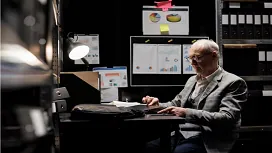Forensic Accounting Courses at Oxford Home Study Centre
Here at OHSC, we offer a choice of world-class Forensic Accounting Courses for candidates interested in beginning careers as forensic accountants. All of our courses are fully-accredited and extensively recognised, paving the way for future success. Our higher-level Diploma course also offers the opportunity to gain full Institute of Certified Forensic Accountants (ICFA) membership.
Level 1 Forensic Accounting Award
Our entry-level Forensic Accountancy Award is perfect for anyone looking to explore fraud-detection and prevention at ground-level. Build a basic knowledge of the field of forensic accountancy, with the help of your personally assigned tutor.
Certificate in Forensic Accounting (Level 1)
This is an introductory course aimed primarily at newcomers, though may also prove useful for experienced accountancy and finance workers. Our Level 1 Forensic Accounting Certificate is fully endorsed and open for enrolment throughout the year.
Certificate in Forensic Accounting (Level 2)
Studying for a Level 2 Forensic Accountancy Certificate could be just the thing to take your career to the next level. Whether new to forensic accountancy or already working in the field, this accessible course offers a detailed introduction to a series of key fundamentals.
Certificate in Forensic Accounting (Level 3)
This fantastic six-module Forensic Accounting Certificate provides a comprehensive introduction to the industry’s key fundamentals. No prior knowledge or experience is required, as the course introduces a range of topics from fraud-detection to evidence-gathering to presentation of findings. A truly outstanding distance learning course for newcomers.
Diploma in Forensic Accounting (Level 4)
This upper-level Forensic Accounting course, offers a significantly more in-depth look at the profession and its key disciplines. Candidates are introduced to criminal psychology, cyber-crime, the importance of non-financial evidence and how to play a key role in a wider investigative team.
Diploma in Forensic Accounting (Level 5)
Our highest-level Forensic Accounting Diploma is designed for the most ambitious candidates, looking to take the profession by storm. With no prior knowledge or experience required, course content covers every key skill, topic and knowledge area at the heart of elite forensic accountancy.
Click on any of the courses above for more information, or contact Oxford Home Study Centre anytime.
Explore various free courses on our website. You can even take a start with one of our Free Accounting courses today.
What is Forensic Accounting?
White-collar crime has been on the rise for decades, as criminals develop increasingly-sophisticated approaches to fraudulent activity. Recent statistics from the Association of Certified Fraud Examiners (ACFE) suggest that close to $1 trillion is lost by global businesses annually, as a direct result of occupational fraud. In an era where accountancy and financial responsibilities are almost entirely computerized, the world is facing the most prevalent threat of fraudulent activity in recorded history.
This is precisely why the call for skilled forensic accountants has likewise never been greater. Thought the exact nature and specifics of common fraudulent activity vary in accordance with geographical region, criminal approaches to fraud bear striking similarities. As such, an elite forensic accountant may have the opportunity to work almost anywhere in the world.
Along with a strong understanding of business accountancy, forensic accountants must possess in-depth knowledge of business law, corporate taxation, criminal psychology and the art of cybercrime. Forensic accounting Courses refers to the study, identification and analysis of financial fraud and malpractice – a fascinating subject of enormous importance to modern society.
What Forensic Accountants Do?
The key duties of the forensic accountant include:
-
Investigating financial records and activities
-
Searching for evidence or patterns indicative of fraud
-
Gathering evidence and preparing reports
-
Presenting findings to the relevant parties
-
Giving evidence in court as an expert witness
After being taken on by a business, the forensic accountant begins comprehensive investigations into key financial processes and activities. They search for evidence of fraudulent activity, analyse key data, gather evidence and ultimately present their findings in a simple, concise and digestible manner. Such is the importance of the forensic accountant’s findings that the evidence they gather may be used in legal proceedings.
How to Become a Forensic Accountant
Forensic accountants may be take on by larger companies as permanent employees, or hired as third-party providers as and when required. Qualified professionals can therefore work freelance, join established accountancy agencies, start their own forensic accountancy firms or seek permanent roles with larger businesses.
As the world’s collective battle with occupational fraud intensifies, a great many smaller to medium-sized businesses are also finding it necessary to take on forensic accountants. It’s a fascinating journey that begins with a single step – why no take yours today?
Typical job titles in the field of forensic accountancy include the following:
-
External Auditor
-
Financial Analyst
-
Financial Assurance Manager
-
Financial Assurance Specialist
-
Forensic Accountant
-
Information Technology Auditor
-
Internal Auditor
-
Senior Auditor
-
Senior Budget Analyst
-
Tax Accountant
-
Tax Specialist
For more information on any of our courses or to discuss enrolment, get in touch with our admissions team today on +44 01865686162, or drop us a line at info@oxfordhomestudy.com
Read Less -






